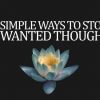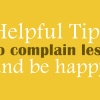Stress, the precursor to anxiety, to unhappiness, to depression. Being stressed, particularly when we don’t need to be is not only unhealthy for our minds, but has been proven to be greatly unhealthy for our bodies.
How do I know?
I have spent a good portion of my life living with stress and anxiety, due to youth abuse that happened to me in the form of bullying.
I didn’t ask for it, I didn’t want it, but due to being what’s known as a Highly Sensitive Person, I had little choice in the matter.
So what is one to do when faced with the fact that their mind, due to no choice of their own, creates stressful situations out of ones we could learn to control better? In a word – Mindfulness.
So what exactly is mindfulness?
What is mindfulness, you might be asking?
It’s not a new term in many places, but in our busy world of today, it is one that now sees more conversation.
Mindfulness is simply finding a way to live in the present moment.
Stress lives in most cases about us worrying about thing that happened in the past or imagining things that we are predicting for the future.
Dr. David Burns defines many of these types of thinking as twisted thinking styles. When I was at the height of my stress, anxiety, and even depression, I found these twisted thinking styles and realized I was doing them all. Click the link and see how many you are doing. Each one of these leads to further stress.
I don’t want to write to you about what not to do, though, because I learned to practice mindfulness activities to quell the stressors in my life. I want to share those here, with the hope that maybe some will resonate with you, the reader.
6 powerful mindfulness exercises that I recommend
First, let me say that these mindfulness activities are all practices. There is no perfection and you can always expect to have good days and bad days handling stress.
But the big lesson I learned is that I can control my mind and the stress it was imposing on me.
Here’s some of the techniques I do to fight the stress that might appear for me on any day through mindfulness actives.
1. Start a gratitude journal
Start with a blank book and write “I’m Thankful For” at the top.
Then each day either at the beginning or end of the day, your choice, write three things you are thankful for that day. It could be as simple as breathing, to as complex as “I worked on a project and solved a difficult problem”.
Maybe you got exercise or had a good lunch. Just keep it positive.
RESULT = You always realize every day has positives to it and your brain will learn to accept that the glass is always half full in life.
2. Walk mindfully
So what does it mean to walk mindfully? It’s really a simple concept.
Our minds are typically racing all the time with different thoughts. Your goal is to focus on the world around you instead of the world in your mind.
Take a nice walk in nature. Focus on the nature around you. You may be surprised at all the beautiful plants, tress, and animals around you. What you won’t focus on is the stress your mind wants to give to you.
RESULT = You feel more at peace with less mind rumination.
3. Eat mindfully
What? Eating mindfully, what does that mean?
Diet has been proven to have ties with stress, and anxiety. Your mind needs to eat healthy as well as your body. Do you drink too much caffeine (sure to add stress). I can tell you what I don’t eat. Fast food, too much processed food, food that gives me bad body or mind reactions.
You may know what foods affect you adversely and what doesn’t. If you don’t, it’s time to find out.
RESULT = Both your mind and body will feel better, reducing stress.
4. Get exercise
Yes I joined a gym at my lowest point. I hated exercising my whole life. But when I needed to get better, I found out that exercise released the promised endorphins and de-stressed my mind as well as making me more fit.
RESULT = Your stress level is immediately better through exercise.
5. Do yoga
Yoga is not some eastern world exercise, but a mindfulness movement practice that lets your mind relax and focus on putting your body in positions to help you stop ruminating about stress and anxiety and focusing on yourself.
RESULT = You learn to relax and focus on something other than the worries in your mind.
6. Meditate
Finally, I began to meditate. This might have been the hardest, because I know that my mind is hyper and racing all the time. Guess what? That’s where my stress was coming from.
Meditation is simply practicing on quieting the mind and learning to stop the rumination to focus on only yourself for a brief period of time.
It is magical, the first time you realize your mind is only thinking about the meditation and not ruminating anymore.
RESULT = You have taught your mind to escape rumination when needed.
Do you have to do all of the above mindfulness activities to get past your stress?
No, you can choose what works for you. Of course, there are other practices that other people do to de-stress. I practice all of the above as many days as I can and it has worked wonders for my stress.
Do I still have bad days? Sure I do, because it is practice not perfection.
Once you give up that stress and find ways through these practices, I hope you too can enjoy a life with less stress and more enjoyment about the luck we have to be alive and the beauty of the world around you that maybe you are not noticing.







